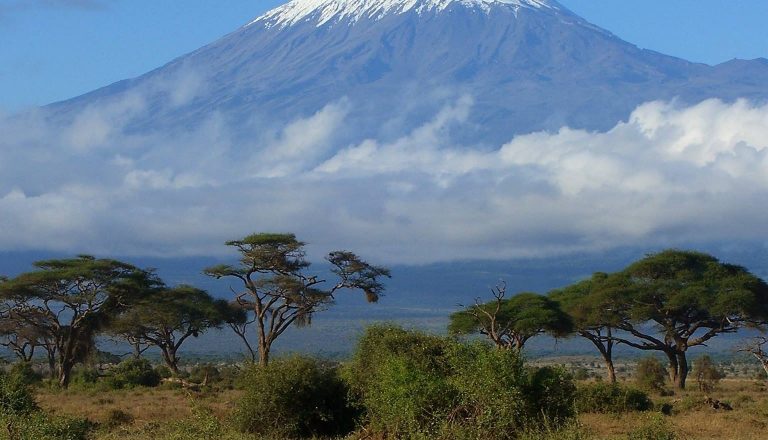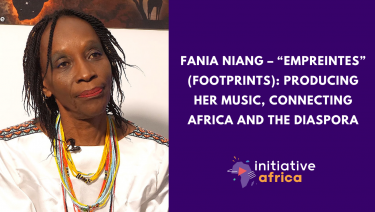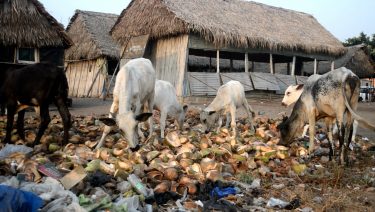Why East Africa’s glaciers are on the brink of extinction

Michael Sommers
Due to climate change, East Africa’s remaining trio of tropical glaciers – on Mount Kenya, Mount Kilimanjaro, and the Rwenzori Mountains – are expected to vanish by 2040.
As world leaders, scientists, and activists gathered in Glasgow for the recent U.N. Climate Change Conference, global media was sounding the alarm about the imminent demise of East Africa’s remaining glaciers. The scintillating stuff of legends, this trio of equatorial glaciers crowning Mount Kenya, Mount Kilimanjaro, and the Rwenzori Mountains spawned the Nile River and inspired Ernest Hemingway’s classic The Snows of Kilimanjaro. Yet now, instead of a life source, these vanishing blocks of ice have become a prophetic symbol of the destruction wrought by climate change.
The “Near Future” is Imminent
“The rapid shrinking of the last remaining glaciers in eastern Africa, which are expected to melt entirely in the near future, signals the threat of imminent and irreversible change to the Earth system,” warned World Meteorological Organization’s secretary-general, Petteri Taalas, in October this year. Scientists have been tracking the melting of these glaciers for decades, but in recent years the pace has accelerated at an alarming rate. The “near future” is now surprisingly imminent; the UN predicts the glaciers will completely disappear by the 2040s.
Global warming is the major culprit in the glaciers’ untimely disappearance. Yet, surprisingly, rising air temperatures are not to blame. Rainer Prinz is a senior scientist, specializing in glaciology, at the University of Innsbruck in Austria. Having spent years studying East Africa’s glaciers, Prinz emphasizes that, unlike those at more northerly latitudes, these tropical glaciers – which sit high above the snowline (where it’s always cold, even in East Africa) – aren’t sensitive to changing air temperatures. They are, however, uniquely susceptible to changes in the amount and frequency of precipitation. Abundant snowfall is what ensures these glaciers’ survival. Apart from adding mass to the ice blocks, snow effectively reflects sunlight (instead of absorbing it) while precipitation-bearing clouds attenuate solar radiation.
With 2040 fast approaching, Prinz confesses that no human intervention can save these glaciers from impending extinction. “The only possibility is that future precipitation levels might change, even with climate change. There’s a chance that in coming years, humid tropical regions could actually see more precipitation.” Prinz explains that Kenya, Tanzania, and Uganda straddle both dry and wet tropical regions. “Based on our models, East Africa could go either way.”
Economic and Spiritual Loss
If the glaciers vanish, the biggest impacts are likely to be the less obvious ones. Contrary to popular belief, East Africa’s glaciers aren’t a source of water for the lowlands. “That’s a myth,” says Prinz. “They’re much too small. The highest precipitation rates occur in the forested areas of the highlands, which provide the largest source of water.”
The biggest loss is likely to be felt in tourism. Over the years, the spectacular paradox of gleaming ice-tipped mountains ascending from a sweltering tropical landscape has seduced many visitors to follow in the footsteps of Hemingway. Meanwhile, for local inhabitants, the most dramatic loss could be spiritual. For many, these lofty white summits are the sacred dwelling places of traditional deities. “In losing the glaciers, people will be losing a part of their spiritual life,” says Prinz.
See also

Eliwilimina Buberwa, president and founder of the NGO Msichana Imara Foundation
In this interview, Initiative Africa speaks with Eliwilimina Buberwa, founder of the NGO Msichana Imara Foundation, which is dedicated to combating period poverty in Tanzania. Drawing on her own experience, she explains how the lack of information, products, and adequate infrastructure still deprives millions of young girls of their right to education. This is a crucial discussion on a public health, gender equality, and social justice issue at the heart of rural communities. Journalist: Alexandra Vépierre

Artificial intelligence in Africa: opportunities, challenges and innovations
Artificial intelligence is reshaping the global economy — and Africa is no exception. In Cameroon, the startup Comparo is helping small and medium-sized businesses stand out in the e-commerce space, thanks to accessible AI-driven tools that streamline web creation and customer targeting. But beyond the promise, AI raises serious concerns: data control, technological dependency, social divides… This report dives into the local innovations and global challenges shaping Africa’s digital transition.

Fania Niang – “Empreintes” (Footprints): producing her music, connecting Africa and the diaspora
With Empreintes, her fifth album, Fania Niang presents an intimate and socially engaged body of work, recorded in Dakar and self-produced for the first time in her career. In this interview, she reflects on her journey between Africa, Europe and the United States, the challenges of independent production, and the musical connection she built with Senegalese musicians who have transcended cultural boundaries. She also shares her perspective on today’s African music scene, the dialogue between diaspora artists and the continent, and her desire to give back by sharing knowledge, experience and creative vision. A powerful conversation about music as memory, identity and transmission. Journalist: Laurence Soustras

CLAYROCKSU, leading female Nigerian rock singer
She grew up singing in church and ended up fronting Nigeria’s rock scene. In this exclusive interview, Clayrocksu opens up about what it means to be a rock artist and a woman in a country dominated by Afrobeats. From her early days mixing Igbo and English lyrics, to building a community of Afro-rock musicians, she shares how music became a form of rebellion, healing, and identity. Between faith, family, and fire, her voice carries a message for all the misfits who refuse to fit in. Journalist: Sharafa





